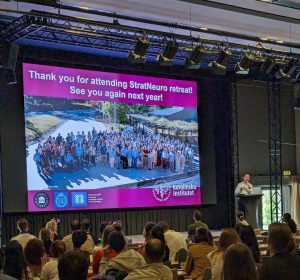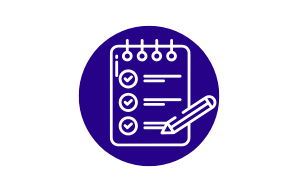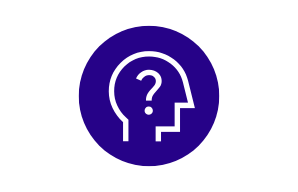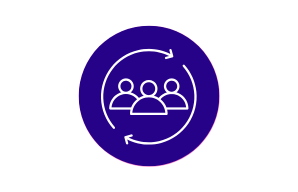Manuela de Las Casas, PhD about the StratNeuro: “It was like scientific tourism”
2 September 2024
StratNeuro Retreat is an annual event held at Karolinska Institutet, a member university of NeurotechEU.
Karolinska Institutet—a partner university of NeurotechEU—organises the StratNeuro Retreat each year in collaboration with Umeå University and the Royal Institute of Technology in Stockholm. The purpose of this retreat is to bring together researchers through lectures and workshops covering topics ranging from molecular to cognitive and social research. One of the 250 participants who attended this year on the 4th and 5th of June was Manuela de Las Casas Felgueroso, a student in the PhD Programme in Neurosciences at Miguel Hernández University of Elche (UMH) at the Institute of Neurosciences, a joint center of UMH and the Spanish National Research Council (CSIC). Felgueroso has participated in various NeurotechEU activities; in this instance, she shares her experience in Stockholm.
In the first place, what three emotions would you highlight from your time at StratNeuro?
Manuela: I would highlight motivation, both during our time there and as we left; a sense of being overwhelmed by the impressive work people are doing; and exhaustion. But not in a negative way—rather, the kind of exhaustion that comes from wanting to make the most of the experience, trying to do things all the time. I attended all the lectures because I didn’t want to miss a single one.
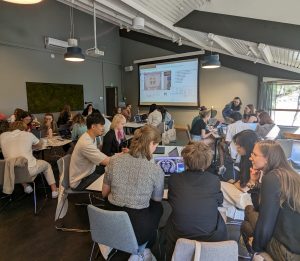
StratNeuro 2024
How would you describe StratNeuro?
Manuela: I would describe it as a camp, a sort of gathering with an academic component.
Did that academic component take the form of lectures, or were there also workshops?
Manuela: There were both. For example, the first day was more oriented towards PhD students and had more of a course format than a conference. But there were also talks, a workshop, and later we presented posters of our work.
What did the workshop you mentioned consist of?
Manuela: Actually, there were three workshop options to choose from. In my case, I signed up for one that involved working with electrophysiology data sets. The idea of this workshop was to present an initiative to unify the data collected.
So, what was the goal of the workshop?
Manuela: Let’s say that each lab has its own way of working with recorded data, so the workshop aimed to learn how to use a tool that allows you to “translate” this data into a universal format. The tool we learned about involved some programming language.
You mentioned that you presented some posters, what do you mean by that?
Manuela: As part of the agenda, there was an activity where we could present our work through posters. These were organized by themes, you had the option to walk around the exhibition, talk with those responsible for each poster, and also answer questions about your own.
Did you gain any insights from this exchange of ideas that made you reconsider or change the course of your research?
Manuela: Not exactly, because the experiments I presented have taken a different direction, so there wasn’t an opportunity for that. However, some attendees who work on similar topics to mine did offer interesting suggestions; in fact, I exchanged contacts with a few of them. I particularly liked this aspect because, since most of us were predocs or postdocs, the atmosphere was very informal—respectful but informal and collaborative. I think this was beneficial not only from an academic perspective but also in terms of how to present your own work, including the aesthetics, organisation, and the explanation itself.
Was there anything about the retreat that surprised you or that you didn’t expect?
Manuela: One of the things that surprised me the most was that, even though the majority of attendees were students or members of Swedish universities, the atmosphere was very international.
I also really appreciated that there was time set aside in the agenda for free time, which is not usually the case in conferences.
Regarding the talks and posters, I also enjoyed attending sessions that had nothing to do with my work. It’s like they take your head out of your computer screen, and it’s fascinating. For example, I’m usually drawn to what’s more closely related to my research. So, the ones that challenge my thinking are those that aren’t related to my work. For me, attending these kinds of talks is like scientific tourism, and I believe that’s what really broadens your horizons. It’s a way to find out what’s happening outside the literature you don’t read in your day-to-day work.
Can you give an example of something that caught your attention?
Manuela: There was one talk that linked the effort involved in making food-related decisions with body mass index. It was intriguing because, on one hand, it’s a controversial topic—you’re putting something uncomfortable on the table. It raises questions about what the research is based on and what the parameters are. On the other hand, how they arrived at those conclusions is also very interesting.
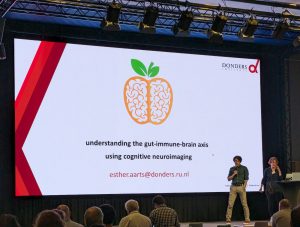
Ponència a StratNeuro 2024
So, Manuela, would you repeat the experience?
Manuela: Yes, without a doubt. Honestly, it was a very good experience overall, but also the treatment we received before, during, and after was very pleasant. We always had someone to turn to with questions, and even when we arrived, a NeurotechEU representative met us and introduced us to the students from the alliance, which is something you really appreciate when you’re away and don’t know anyone.
